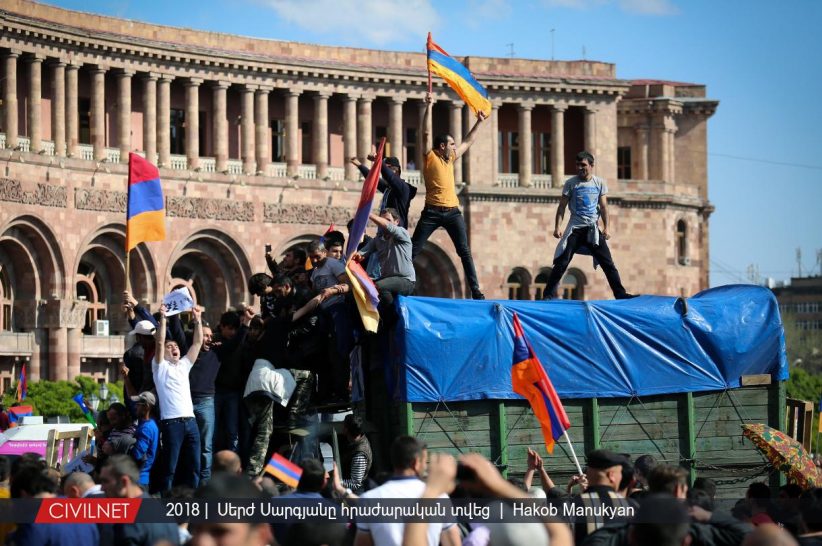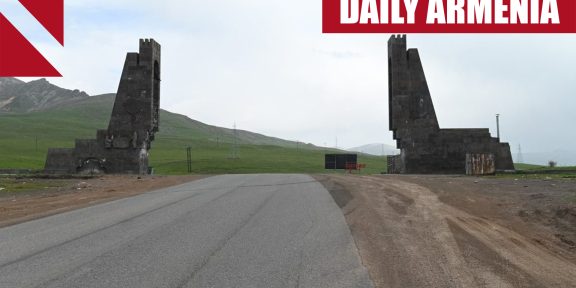By Samuel Armen
After 11 days of peaceful protests – and years of an often quieter struggle – the Armenian people have earned their first major victory towards the formation of a new Armenia: the resignation of Prime Minister Serzh Sargsyan on April 23rd, 2018.
Over one-hundred-sixty thousand citizens of Armenia – led by Nikol Pashinyan and bolstered much by the youth – were unified in their determination for genuine, long-lasting change. Despite the urgency, vast number of participants, and the violence inflicted upon the people by the police, the protests somehow remained peaceful. How many demonstrations are characterized by singing and dancing in the streets?
But for me, a Gyumri-born New-York-raised member of the diasporan community, I was saddened by the absenteeism of many in the diaspora. I scoured my social media, and just as often as I saw our Armenian protesters being jammed into unmarked cars by masked officers, I found a vast majority of diasporans remaining silent. This general restraint was apparent during the Armenian Genocide commemorations on Sunday, April 22nd in New York City, Boston, and Los Angeles. I understand that the commemoration is a time to mourn those lost in the massacre, and to fight for its national recognition. But, the genocide and the fears that have perpetuated its non-recognition is all too reminiscent of the current corruption and silencing in Armenia that caused the current protests in the first place. Even if a few words were uttered, they did not match the gravity or urgency of the ongoing revolution. I should, however, mention that there were smaller pockets of supportive diasporans who separated from the traditional gatherings to rally support. And I genuinely appreciate the voices, no matter how few. But all of this made me wonder: where were our leaders? Where were our diasporan Nikols? Where were our supporting crowds?
Those who were silent over the 11 days – or even spare in their support for those struggling for change – will live with the fact that they were not a part of the first leap in Armenia’s greatest success in decades. Yet, there are so many steps ahead, and plenty of reasons to become involved now.
April 23rd has been, to some, an inevitability considering Armenia’s changing landscape over the recent years.
I have had the distinct privilege both of visiting Armenia several times a year and of working with the people – from adolescent students in rural villages, to undergraduates in Yerevan, to leaders of various NGOs. Since one particular visit in February 2017 – exactly three back-and-forth journeys ago – I have noticed an exponential progression in Armenia. A country that was once (understandably) homogeneously reluctant towards change, was becoming increasingly hopeful, modernized, and heterogeneous. I noticed it first during that February last year, when I stood outside a tavern on a snowy Saryan Street hearing Armenians speak French, Italian, Spanish, German, English, Russian and Armenian. I noticed it in the summer of 2017, when I watched a group of COAF high school students in the village of Hatsik raise their hands eagerly in class and collaborate to create microstories. I noticed it this last winter while listening to impassioned Armenians discuss how they were successfully leveraging social media to bolster their fledgling businesses.
And though I was not there during the 11-day protest of the Velvet Revolution, I witnessed and did all I could to broadcast the change that Armenians were carving for our country.
The fact is simple: Armenia didn’t just change last week with the resignation of Serzh Sargsyan. Armenia has been evolving. Whether this is factored primarily by the Syrian influx beginning in 2011, or the ramping up of particular on-site international NGOs (the real ones), or the disappointment with Russia’s arms deals with Azerbaijan prior to the four-day-war between Armenia and Azerbaijan in April 2016, or even the establishment of the Chinese Embassy and how it has broadened our tourism to include greater numbers of people from The Gulf and Asia, bears little significance. The fact remains: the progression has been forged, embraced, and led by the people of Armenia.
The world will understand that April 23rd is just a crescendo; it is a beautiful milestone.
Now, just as the people of Armenia have tirelessly worked – and continue to work – to peacefully dismantle the corrupt systems in order to establish a fair government that progresses the people, diasporans have the responsibility of doing the same in their respective communities. The diaspora must get involved, now, or forever remain in the fading creases of a turning page.
And though politics are often inexhaustibly complex, the next steps for the Armenian diaspora are unusually straightforward:
Outliers who have shown their support to the people of Armenia: Please continue to do so, and do not be even slightly discouraged by generalized claims that the diaspora is completely uninvolved. That is clearly a fabrication. You might be criticized for your zeal. I certainly have. But in the digital age, we have megaphones at our fingertips. Continue to listen to what the people are saying, and continue to broadcast it to the world. Nothing allays one’s worries more than knowing one isn’t alone.
Diasporan masses who were inactive during the demonstrations: Please take a few minutes to be informed. Reputable news outlets and courageous broadcasters in Armenia will keep you informed, and offers us all the opportunity – in turn – to help keep others informed. Our vision and our voice decides what is newsworthy, not the media. Your participation might yield more positive circumstances than you imagine.
The next few weeks will likely determine the fate of Armenia’s long-term future. While the people of our land continue to peacefully labor for a new Armenia, we must all work together to do our own part. We must remain informed, inform others, and work to discourage complacency in the diaspora. Our responsibility is to help our people who have risked their lives for change.
Just as the revolution unified varying groups in Armenia – some of them once in conflict with one another – our support for them can serve as a means for us diasporans to unite. All of us want a better Armenia, and through collaborating and listening to the priorities of the people, we can help make that a reality. But all of us must work together.
We do indeed reveal elements of our character in times of love, heartbreak, joy, and sorrow. But when our security is in danger – when we have much to risk and plenty to lose; when we experience deep discomfort – we are coerced into revealing a part of us that is perhaps the most true, resting intransigently beneath the shifting layers.
Now is the time for all of us to act.
Samuel Armen is an English/AVID Teacher & AVID Coordinator
















